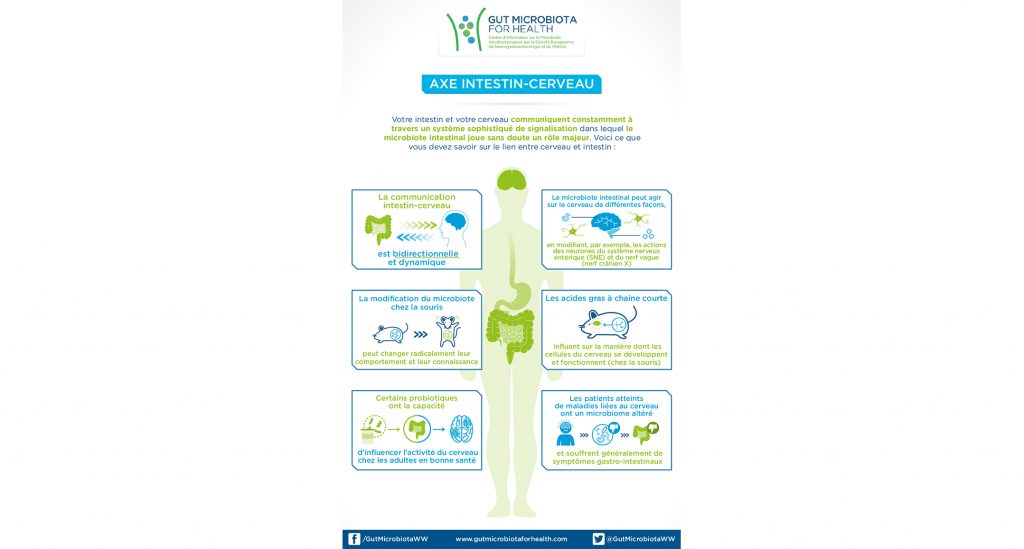Nous savons déjà que les intestins ont leur propre système nerveux, le SNE (système nerveux entérique), qui compte plus de 500 millions de neurones. Les scientifiques étudient à présent la manière dont les cellules nerveuses du SNE communiquent avec les neurones du cerveau à travers l’« axe intestin-cerveau ». Les dernières recherches sur le sujet montrent que tout ce qui se produit dans le milieu intestinal, y compris l’activité des bactéries qui y résident, influence les actions des neurones du SNE.
Références :
Furness JB, Poole DP. Nonruminant nutrition symposium: Involvement of gut neural and endocrine systems in pathological disorders of the digestive tract. Journal of Animal Science. 2015; 90(4): 1203-1212. doi:10.2527/jas.2011-4825
Zhou L, Foster JA. Psychobiotics and the gut–brain axis: in the pursuit of happiness. Neuropsychiatric Disease and Treatment. 2015; 11: 715–723. doi https://dx.doi.org/10.2147/NDT.S61997
Kunze WA, Mao Y, Wang B, et al. Lactobacillus reuteri enhances excitability of colonic AH neurons by inhibiting calcium-dependent potassium channel opening. J. Cell. Mol. Med. 2009; 13(8B): 2261-2270. doi:10.1111/j.1582-4934.2009.00686.x
Forsythe P, Bienenstock J, Kunze WA. Vagal Pathways for Microbiome-Brain-Gut Axis Communication. In: Lyte M & Cryan JF, eds. Microbial Endocrinology: The Microbiota-Gut-Brain Axis in Health and Disease. New York: Springer; 2014:115-133.
Dinan TG, Cryan JF. The impact of gut microbiota on brain and behaviour: implications for psychiatry. Current Opinion in Clinical Nutrition & Metabolic Care. 2015; 18(6): 552–558. doi: 10.1097/MCO.0000000000000221
Bourassaa MW, Alima I, Bultmanc SJ, Ratan RR. Butyrate, neuroepigenetics and the gut microbiome: Can a high fiber diet improve brain health? Neuroscience Letters. 2016; 625(20): 56–63. doi:10.1016/j.neulet.2016.02.009
Luczynski P, Whelan SO, O’Sullivan C, Clarke G, et al. Adult microbiota-deficient mice have distinct dendritic morphological changes: differential effects in the amygdala and hippocampus. European Journal of Neuroscience. 2016; 44(1). doi: 10.1111/ejn.13291
Bercik P, Denou E, Collins J, Jackson W, et al. The Intestinal Microbiota Affect Central Levels of Brain-Derived Neurotropic Factor and Behavior in Mice. Gastroenterology. 2011; 141(2): 599-609. DOI: http://dx.doi.org/10.1053/j.gastro.2011.04.052
Li W, Dowd SE, Scurlock B, Acosta-Martinez V, Lyte M. Memory and learning behavior in mice is temporally associated with diet-induced alterations in gut bacteria. Physiology & Behavior. 2009; 96(4-5); 557-567. doi:10.1016/j.physbeh.2008.12.004
Mayer EA, Padua D, Tillisch K. Altered brain-gut axis in autism: comorbidity or causative mechanisms? Bioessays. 2014; 36(10):933-9. doi: 10.1002/bies.201400075.
Tillisch K, Labus J, Kilpatrick L, et al. Consumption of Fermented Milk Product With Probiotic Modulates Brain Activity. Gastroenterology. 2013; 144(7). doi: 10.1053/j.gastro.2013.02.043


